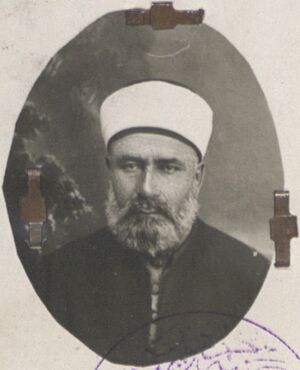İskilipli Mehmed Atıf Hoca facts for kids
Quick facts for kids Mehmed Âtıf Hoca |
|
|---|---|
| محمد عاطف خوجه | |
 |
|
| Religion | Islam |
| Denomination | Sunni |
| Other names | İskilipli Mehmed Âtıf |
| Personal | |
| Nationality | Ottoman Empire, Turkish |
| Born | Mehmed Âtıf 1875 Toyhane, Bayat, Ottoman Empire |
| Died | 4 February 1926 (aged 51) Ankara, Turkey |
| Cause of death | Execution by hanging |
Mehmed Âtıf Hoca (Ottoman Turkish: محمد عاطف خوجه) was a Turkish religious scholar and teacher. He was born in 1875 in the village of Toyhane, which was part of the Ottoman Empire (today's Turkey). He became known as "İskilipli" because he worked as an imam (a Muslim religious leader) in İskilip for a few years.
In 1893, he moved to Istanbul to continue his studies. He attended a religious school called a medrese and later studied at Darü'l-fünun Faculty of Divinity. After graduating in 1903, he became a teacher at the madrasah in the Fatih Mosque, Istanbul. He was arrested and jailed several times during his life. He was also one of the founders of a group called Cemiyet-i Müderrisin. He and his group were strongly against the new Turkish government in Ankara that led the Turkish War of Independence.
Contents
His Book on Westernization and the Hat
In 1924, before big changes happened in Turkey, Mehmed Âtıf Hoca wrote a book. It was called Frenk Mukallitliği ve Şapka, which means Westernization and the [European] Hat. In this book, he supported traditional Sharia law. He was against what he saw as Western influences. These included things like "Theater, Dance" and the "western hat."
From his point of view, the Western hat was a sign of non-Muslims. He believed that if Muslims wore this hat, they would lose their Islamic identity. However, on November 25, 1925, a law called "The Hat Act" was passed by Atatürk. This law made it mandatory to wear only the Western hat. It banned other headwear like the fez.
Arrest and Trial
Mehmed Âtıf Hoca was arrested on December 26, 1925. He was then sent to Ankara for trial. His trial began on January 26, 1926. The person prosecuting him asked for a three-year prison sentence. But the court decided to delay the trial until the next day.
On the next day, Mehmed Âtıf Hoca said he no longer wanted to defend himself. He was put to death on February 4, 1926.
His Ideas on Western Civilization
Mehmed Âtıf Hoca also wrote another book called Medeniyet-i Şer'iyye ve Terakkiyat-ı Diniyye. This title means The Civilization of the Sharia and Religious Progress. In this book, he shared his thoughts on what parts of Western civilization were good and what parts were harmful.
He believed that Western civilization had two sides. One side was helpful for people, and the other was not. He said that the teachings of Prophet Muhammad allowed Muslims to use helpful new ideas from the West. For example, he mentioned a saying that encourages inventors who create useful things. Another saying suggested that people know best about worldly matters.
- Useful Inventions: Mehmed Âtıf Hoca thought that Islam allowed and even encouraged useful inventions. These could be anything from a sewing needle to railroads, airplanes, and communication tools. He believed that using these tools and skills would help the Muslim community grow. He also said that Islam encourages education for everyone, both boys and girls, to help with these inventions.
- History of Progress: He pointed out that many inventions and ideas, like industry, first started in Asia and Egypt thousands of years ago. He believed that early Greek art was influenced by these older civilizations. Muslims later built on these discoveries and became very good at arts and sciences.
- Influence on Europe: He noted that during the crusades, Europeans learned about Islamic arts from Muslim countries. This helped European art to develop. He also mentioned that Europeans were amazed by the advanced civilization in Andalusia (parts of Spain and Portugal) when Western Europe was still in a difficult period. This showed him that Western civilization had roots in Eastern civilization.
- Why Muslims Lagged: He wondered why Muslims today might not be as advanced. He thought it was because they forgot an important part of their religion: working hard to earn a living. He believed Muslims could only benefit from their faith if they lived by its principles every day. If they just kept these ideas in books and did not use them, they would not gain anything. He quoted Prophet Muhammad, saying that "some knowledge is like ignorance" if it is not put into practice.
- Forbidden Western Aspects: While he supported useful inventions, he strongly believed that Islam forbids the bad parts of Western civilization. These included things like unbelief, unfairness, gambling, and dancing. He said that places like bars and theaters were forbidden. He felt it was wrong for Muslims to copy the Western lifestyle completely. He thought Western civilization was not a perfect model because it focused only on money and encouraged bad human desires, rather than caring about people's morals and spiritual happiness.
Memorial and Film
Today, there is a small memorial for Mehmed Âtıf Hoca in İskilip. In 1993, a film about his life was released. Its Turkish title is İskilipli Atıf Hoca / Kelebekler Sonsuza Uçar.
 | Aaron Henry |
 | T. R. M. Howard |
 | Jesse Jackson |

